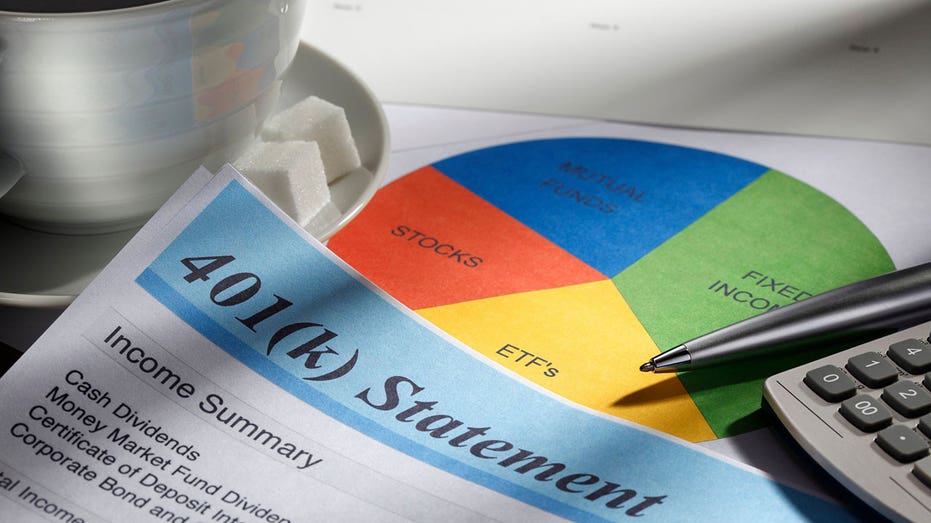Year-end bonuses: Smart ways to use your extra cash
One survey found 57% of US companies said they had plans to give out bonuses at the end of the year
Consumers will have 'more resilience' in 2023: Zach Hill
Horizon Investment head of portfolio management Zach Hill discusses concerns around markets and the economy in 2023.
With the end of the year rapidly approaching, many workers anticipate receiving bonuses from their employers.
Robert Half said in early November that one of its surveys found that this year, more than half of U.S. companies, 57%, said they had plans to give out year-end bonuses to employees. That marks a decrease from 2021, when 77% indicated they intended to do so, according to the business consulting firm.
While there are many ways for a person to use their end-of-the-year bonuses, some good things they can do with them include paying off debt, saving, investing, and building an emergency fund, according to experts.

A person holds a jar full of savings money. (iStock / iStock)
Year-end bonuses can serve as a "great way to tackle" debt "aggressively," per the Summit Wealth Management Group at Morgan Stanley.
BONUS SEASON NOT LOOKING BRIGHT FOR PRIVATE EQUITY, WALL STREET: REPORT
In mid-November, the Federal Reserve Bank of New York said that by the end of the third quarter, total household debt had hit $16.51 trillion, a $351 billion increase from the prior quarter.
"Determining how and when to pay off debt is dependent upon your income or overall cash inflow, your risk tolerance, your goals and your time horizon for investing," Emily Irwin, senior director of advice and planning at Wells Fargo Wealth & Investment Management, said in a statement to FOX Business.
According to Irwin, people wishing to determine their risk tolerance while trying to figure out how to spend their bonuses should ask themselves how they feel about their debt, the status of their emergency fund and how much they can allocate for investing or paying off debt. One should also "consider your goals," she said.
"You don’t have to choose between using your bonus to invest or pay down debt – you can do both," Irwin also stated.
Saving some or all of your year-end bonus can benefit yearly savings goals. It can also help people get closer to their longer-term plans, according to Morgan Stanley’s Summit Wealth Management Group.
If feasible, Irwin recommended saving 10% of paychecks as a starting point for creating yearly savings goals and incrementally upping the amount until "ideally" reaching 20% being allocated toward retirement and investments.
INFLATION BIG SETBACK FOR RETIREMENT SAVINGS
"If you’re an employee who participates in a 401(K) plan, it’s likely that a portion of your bonus will be allocated to your retirement account (unless you make a timely change to your election)," Irwin said in the statement. "This can be a great strategy because it’s earmarking your bonus dollars for retirement years."

401(k) plans ensure Americans have enough money to live on after they retire and no longer receive an annual wage. (Getty / Getty Images)
The Internal Revenue Service (IRS) says individuals under 50 can contribute up to $20,500 annually to their 401(K)s in 2022. In 2023, that limit will go up by $1,000 to $22,500. People ages 50 and above can contribute a maximum of $27,000 in 2022 and $30,000 next year, according to the IRS.
For 2022, the contribution limit for IRAs is $6,000 for people below 50 and $7,000 for those above that age. The limit for 2023 is slightly higher, with ages below 50 allowed to contribute $6,500 to IRAs and ages 50 and up allowed $7,500.
For investing year-end bonuses, new investors could choose index funds, J.P. Morgan Wealth Management’s Elana Dure wrote in an article. Aside from index funds, some other potential options for investors could include individual stocks, exchange-traded funds or mutual funds, according to the article.
WILL A SANTA RALLY COME TO WALL STREET THIS YEAR?
"The idea is to get into the mindset of saving and investing with the motivation being empowerment and flexibility as a reward," Irwin told FOX Business.

A coin is dropped into a piggy bank in this arranged photograph taken with a tilt-shift lens to illustrate the theme of risk in Oradell, New Jersey, on June 18, 2015. (Photographer: Ron Antonelli/Bloomberg via Getty Images) (Photographer: Ron Antonelli/Bloomberg via Getty Images / Getty Images)
Another option is socking some bonus money away in your emergency fund, according to the J.P. Morgan Wealth Management article and Irwin. Irwin said that is an "easy way to put yourself in a position to deal with both fun and stressful, unexpected events," whether it is an impromptu trip or your car needs repairs.
"I suggest that people pull enough into an emergency fund to get to a point in which they’re saved $1,000-$5,000 – you may be able to fund all or most of your emergency fund with your bonus," she said.
Other steps people can take to achieve their goals for emergency savings, Irwin told FOX Business, including eliminating or reducing some spending.




















